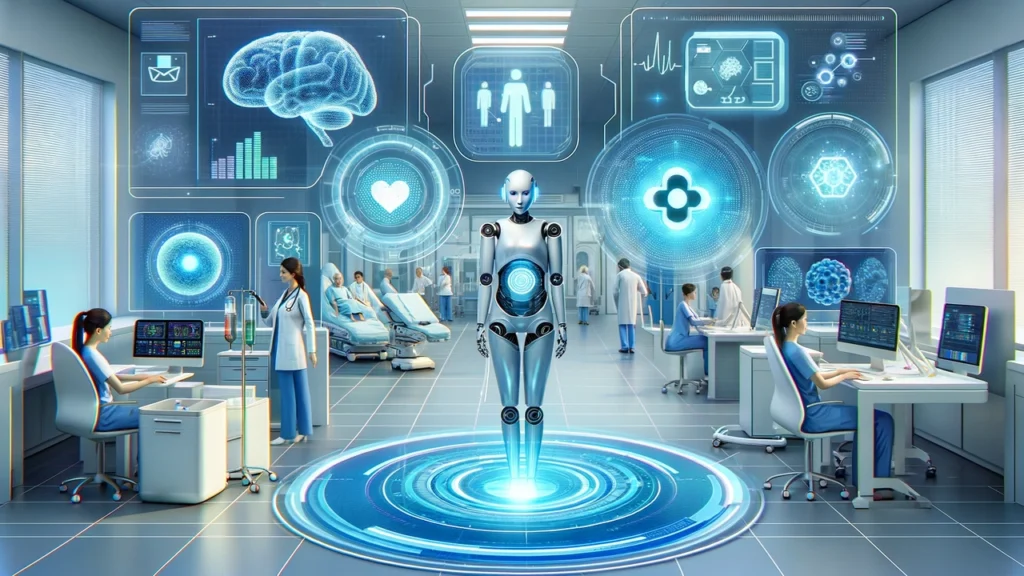10 Benefits of Artificial Intelligence in Healthcare: A Leap Towards Futuristic Medicine
Artificial Intelligence (AI) is revolutionizing various industries, and healthcare is no exception. With its ability to analyze large datasets and enhance decision-making, AI is bringing significant improvements in medical care quality, efficiency, and accessibility. In this blog, we explore the top 10 Benefits of Artificial Intelligence in Healthcare.
1. Improved Diagnostic Accuracy AI algorithms, particularly those based on machine learning, can interpret medical images like X-rays, CT scans, and MRIs with high accuracy, often surpassing human performance. This precision leads to better diagnosis and treatment plans.
2. Personalized Medicine AI helps in developing personalized treatment plans by analyzing a patient’s genetic makeup, lifestyle, and environmental factors. This tailored approach ensures more effective treatments and better outcomes.
3. Enhanced Drug Development AI accelerates the drug discovery process by predicting how different compounds will behave and how likely they are to make an effective treatment. This not only speeds up the development process but also reduces costs.
4. Predictive Analytics for Preventive Medicine By analyzing patterns in healthcare data, AI can predict disease outbreaks, patient admissions, and other important healthcare outcomes, allowing for better preventive measures.
5. Robot-Assisted Surgery AI-driven robots assist surgeons in performing precise and minimally invasive procedures, improving patient recovery time and reducing surgical complications.
6. Virtual Health Assistants Virtual assistants powered by AI provide 24/7 support to patients, reminding them to take their medications, and providing answers to health-related queries, enhancing patient engagement and care.
7. Streamlining Administrative Tasks AI streamlines administrative tasks in healthcare settings, such as scheduling appointments, patient data entry, and billing, thus allowing healthcare professionals to focus more on patient care.
8. Enhanced Patient Experience AI technologies like chatbots and personalized health recommendations improve patient engagement and satisfaction, making healthcare more patient-centric.
9. Better Resource Management AI helps in efficient resource allocation in healthcare facilities, ensuring optimal utilization of equipment, staff, and other resources.
10. Advancements in Telemedicine artificial intelligence enhances telemedicine by providing doctors with advanced tools for diagnosis and treatment recommendations, making healthcare more accessible, especially in remote areas.

Enhanced Diagnostic Accuracy
One of the paramount advantages of artificial intelligence in healthcare is its ability to augment diagnostic accuracy. Utilizing artificial intelligence in medical imaging, like MRI and CT scans, has led to earlier and more precise diagnoses of conditions such as cancer and neurological disorders. This technology minimizes diagnostic errors, a critical factor in effective treatment planning and improved patient outcomes.
Personalized Treatment Plans
AI shines in its ability to analyze vast amounts of patient data, leading to personalized treatment plans. By considering an individual’s genetic makeup, lifestyle, and medical history, AI algorithms can tailor treatments that are more effective and have fewer side effects, revolutionizing patient care with a personalized approach.
Improved Patient Engagement and Care
AI-powered apps and wearable devices have transformed patient engagement and care. These tools provide real-time health monitoring and personalized feedback, fostering a proactive approach to health management. Additionally, AI enhances patient-doctor interactions by providing physicians with comprehensive patient data, leading to more informed decisions and better care.
Efficiency in Drug Development
In the realm of drug development, artificial intelligence significantly enhances efficiency. By analyzing complex biological data, AI accelerates the discovery of new drugs and reduces the time and cost associated with pharmaceutical research. This rapid development cycle is vital for responding to emerging health crises and improving global health.
Managing Medical Records and Data
AI systems excel in managing vast amounts of medical records and data. They streamline data processing, ensuring accurate and timely patient information. Furthermore, artificial intelligence plays a crucial role in maintaining data privacy and security, a top priority in the sensitive field of healthcare.
Predictive Analytics in Healthcare
AI’s predictive analytics capabilities are a game-changer in healthcare. These systems can anticipate potential epidemics and outbreaks, as well as forecast patient admission rates, enabling healthcare providers to allocate resources more effectively and prepare for future challenges.
AI in Surgical Assistance
Robotic surgery, assisted by artificial intelligence, is revolutionizing the operating room. These robotic systems enhance surgical precision and outcomes, leading to minimally invasive procedures with faster recovery times. AI in surgery represents a significant stride towards safer and more effective surgical interventions.
Telemedicine and Remote Monitoring
Telemedicine, empowered by AI, has expanded access to healthcare, particularly in remote areas. AI-driven platforms facilitate virtual consultations and continuous patient monitoring, ensuring that quality healthcare is not confined by geographical boundaries.
Training and Education for Healthcare Professionals
AI also plays a pivotal role in training healthcare professionals. Through medical simulations powered by AI, practitioners can hone their skills and enhance their knowledge, leading to improved patient care and a higher standard of medical practice.
Reducing Healthcare Costs
AI contributes to reducing healthcare costs by optimizing resource allocation and decreasing operational expenses. Automated systems and art ificial intelligencedriven diagnostics reduce the need for redundant tests and procedures, leading to cost-effective healthcare delivery.

AI in Mental Health Care
In the field of mental health, artificial intelligence aids in the early detection and treatment of mental health issues. AI-based tools and apps provide innovative therapeutic options, complementing traditional mental health care and offering new avenues for treatment and support.
Challenges and Ethical Considerations
While AI in healthcare presents numerous benefits, it also poses challenges and ethical considerations. Addressing the limitations of AI, such as data biases, and navigating the ethical implications of automated decision-making are critical for the responsible integration of AI in healthcare.
Future Prospects of AI in Healthcare
The future prospects of AI in healthcare are vast and promising. Emerging AI technologies, such as advanced predictive models and AI-integrated genomics, hold the potential to further revolutionize healthcare, making it more efficient, effective, and personalized.
Global Impact of AI on Healthcare Systems
AI’s impact on global healthcare systems is profound, particularly in developing countries. By enhancing universal healthcare delivery and accessibility, artificial intelligence is pivotal in bridging healthcare disparities and promoting global health equity.
Patient Safety and AI
AI enhances patient safety by monitoring and reducing medical errors. Automated alerts and predictive analytics play a crucial role in preventing adverse events, making healthcare safer and more reliable.
AI in Genomic Medicine
AI’s application in genomic medicine personalizes healthcare at a molecular level. By analyzing genetic information, AI aids in the understanding and treatment of genetic diseases, paving the way for personalized medicine.
10 benefits of artificial intelligence in healthcare: Conclusion
10 benefits of artificial intelligence in healthcare. The integration of artificial intelligence in healthcare is not just a futuristic concept; it’s a present-day reality that is continuously evolving. The benefits range from enhanced patient care to improved operational efficiency, marking a new era in medical science. As AI technology advances, we can expect even more groundbreaking changes in the healthcare sector.
AI Generated Quotes: A Revolution In Digital Expression
FAQs
How does AI improve diagnostic accuracy? AI analyzes extensive datasets, identifying patterns and anomalies for more accurate and early diagnoses.
In what ways does AI personalize patient care? AI considers each patient’s unique medical history and genetic makeup to tailor treatment plans.
Can AI reduce healthcare costs? Yes, by streamlining operations and minimizing unnecessary procedures, AI can significantly lower healthcare costs.
How does AI benefit medical imaging analysis? AI enhances the speed and accuracy of medical image analysis, aiding in early disease detection.
What role does AI play in drug development? AI accelerates the drug development process, rapidly identifying potential therapeutic candidates.
Does AI improve healthcare training and education? Yes, AI provides simulation-based learning and up-to-date medical information, enhancing the training of healthcare professionals.








